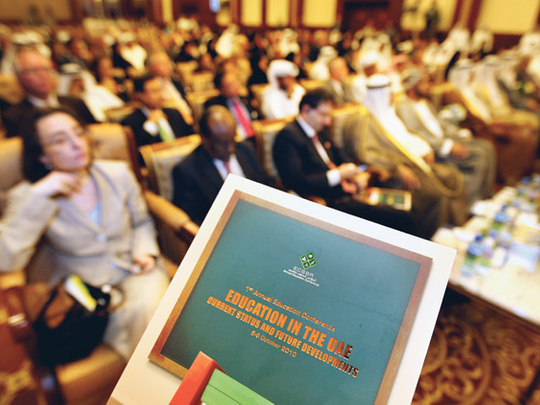
Abu Dhabi: Opinions clashed on Tuesday over which language should be the medium of instruction in the education system.
The significance given to foreign languages in schools and colleges "does not contradict with our universities and colleges being genuine national institutions," Shaikh Nahyan Bin Mubarak Al Nahyan, Minister of Higher Education and Scientific Research, told the audience at the Emirates Centre for Strategic Studies and Research's (ECSSR) Conference "Education in the UAE, Current Status and Future Development", which began on Tuesday.
However, others said Arabic should be the language of instruction in educational institutions and urged "the emiratisation" of the national education system to create "good citizens and not just good workers."
"Being well-versed in foreign languages is essential for students in keeping with our strong commitment to having high quality curricula and programmes, relevant to the labour market and matching the stature of the UAE in all areas," Shaikh Nahyan said.
Foreign languages
He stressed though that importance of learning foreign languages "does not contradict with our universities and colleges being genuine national institutions, because we are also concerned that graduates are well-versed in Arabic and the Arab and Islamic heritage." But others disagreed saying education should be "free from foreign influence."
"After four decades of attempts to develop education in the UAE, the educational system is failing far too many people. It is in response to this failure that the education policy in the UAE should be home-grown to meet our needs and create good citizens," said Dr Mariam Sultan Lootah, assistant professor of political science at the UAE University.
Dr Mariam told the conference that any development policy should arise from this country. "We can benefit from other people's experiences but we should not let these experiences prevail as development cannot be imported from abroad."
Medium of instruction
Advocating Arabic as a medium of instruction and the federal system over the local educational councils, Dr Mariam said: "We are a federal country whose top-most concern is boosting the federation ... So the native language Arabic should be given priority as a medium of instruction and not just the language of heritage and culture."
Dr Mariam warned that local educational councils may be heading in the opposite direction because they support the use of English as an academic language. Dr Mariam said many private schools which offer more than 17 curricula are not subject to real supervision from the Ministry of Education. She said only 11 per cent of teachers are Emirati, asking: "Who can guarantee that foreign teachers, foreign languages and foreign curricula would boost our national identity?"
Dr Abdul Khaleq Abdullah, professor of political science at the UAE University, said it is high time to emiratise education.
"As we have done to the UAE Armed Forces before over the last 20 years, education has to be emiratised to create good citizens," Dr Abdullah said.
Reform: Setting goals
Humaid Mohammad Obaid Al Qutami, Minister of Education, said in his keynote speech the programme of educational reform must pursue a long-term plan, which is constant, thoroughly conceived and subject to continuous assessment.
"This plan must be sufficiently resilient for development purposes, compatible with future labour market dynamics and the requirements of secondary education. The reform consists of reinforcing school curricula, developing teaching staff competence, developing school infrastructure and reinforcing school activities." He said, the ministry has set a 10-year, student-centred strategic plan, for universal reform of the education sector.
Which language would you like your children to be taught? What languages do you think should be emphasised?












